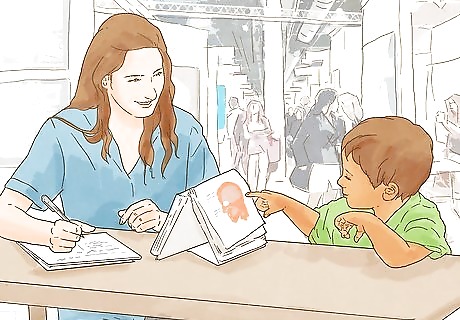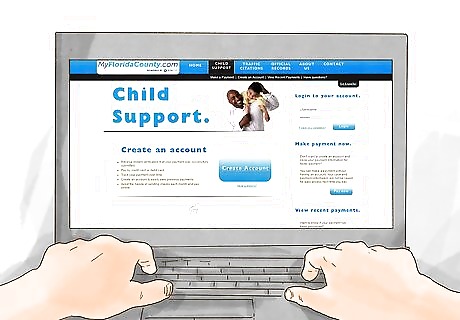
views
Volunteering

Tutor underprivileged students. Education is one of the best predictors of success in children. You can help struggling students succeed in school by donating your time or money as a tutor or a regular person. You might tutor children in reading, spelling, current events, Algebra, writing, cursive, Math, Science, History, and/or English as a Second Language. You can contact any of your local school board and/or schools themselves to see if they have an after-school program/club to tutor children. Some people choose to go abroad to teach impoverished children who might not have access to good schools.

Hold a clothes and books drive. Many children do not have basic necessities. New clothes, books, and toys can make a big difference in their life. Working with a group of people, collect lightly used or new supplies for children. Identify a local charity, such as the Salvation Army, that would be willing to distribute these for you. Some things you can collect include: School supplies Gifts for the holidays New shoes Coats, sweaters, and other cold weather clothing Textbooks Musical instruments

Sponsor an impoverished child. There are around 400 million children worldwide living in extreme poverty. For a small monthly donation, you can help one child pay for food, school, medicine, and clothes. There are many charities that offer to help you sponsor a child, both at home and abroad. Some reputable ones include: Children International World Vision Save the Children

Contact local charities. Some charities might need volunteers to help organize inventory, supervise events, and distribute aid. Call your local branch of a child welfare charity to see what they need. Ask them how you can best volunteer your time. If you are a professional with particular skills, you might be able to offer your services free of charge to help reduce administrative costs for the charity. This allows the charity to devote their resources to helping children. Services you might be able to offer include accounting, contracting work, and legal aid. If your charity is holding a fundraiser or event, you can offer to help out. You might be asked to help sell tickets, run a booth, or clean up afterwards.
Raising Money for Charity

Decide what type of aid you want to give. Money can go a long way in helping a charity reach out to poor children, but you should think about where you want your money to go to. Many charities allow you the option to choose how to spend the money. You can decide to send your money towards: Food School tuition and fees Medical care Books and toys Clothes Clean water Shelter Supporting an orphanage

Choose a respected children's cause to support. There are many different children’s charities. Some are focused towards a specific cause, such as education or healthcare. Others are for the general welfare of children. Before you donate money to a charity, research the charity to make sure that they provide the majority of their funds to their cause. Check Charity Navigator to see if they have at least a three star rating. Some reputable charities include: UNICEF Children in Need St. Jude’s Children’s Research Hospital Children’s Miracle Network Youth Law Center Reach Out and Read

Publicize your cause. While you can give out of your own pocket, you might also want to encourage other people to donate as well. Advertise your charity of choice to friends and family. Encourage others to chip in so that your money can have a larger impact. You might consider publicizing your cause through: Social media such as Facebook, Twitter, or Instagram Blogs Video appeals Your personal website

Sell goods. One great way to raise money for children is to sell something and give the proceeds to charity. You can set up a stall in front of your house, at a school, or during a farmer's market. Advertise your sale as a charity benefit. You may find that strangers are willing to buy things just to help out a good cause. Some different types of sales include: Yard sale Hand-crafted goods such as bracelets or scarves Bake sale Lemonade stand

Crowdfund donations. Crowdfunding platforms allow you to set up a special page to raise money for a nonprofit of your choice. These webpages can attract many small donations from a large pool of people. There are many crowdfunding websites that specialize in fundraising for charities. You might consider using: Razoo Causes FundIt.Buzz (UK) Indiegogo
Transforming Yourself into a Personal Advocate

Become a mentor. There are several organizations that help needy children connect with stable adults who can guide them through school and life. These programs offer at-risk youth a vital support system. Kids who have a mentor are more likely to graduate high school and less likely to abuse drugs or alcohol. Some mentoring programs include: Big Brothers Big Sisters of America Children’s Aid Society Stand Up For Kids Your local department of child services may also have a mentoring program.

Apply to be a court-appointed special advocate (CASA). Children in foster care often do not have legal guardians who can represent them. A court-appointed special advocate is a representative who looks out for the best interests of a child in court. While they are not an attorney, they do represent foster children in court instead of a parent or legal guardian. CASAs often form personal bonds with their children, thus ensuring that they are protecting the rights and needs of the child. You can locate a CASA program near you on the CASA for Children website. You will have to undergo a thirty-hour training program before you will be assigned a case.

Consider fostering a child. If you have the space and finances to take in a child, you can foster a child. Foster care is intended to provide a temporary, stable home for a child who has been removed from their parents. The process for fostering takes months, but a dedicated foster parent can change the life of a disadvantaged child by providing support, stability, and consistency during a tumultuous time in their life. In the US, you will have to apply to be a foster parent at your state Department of Child Services or Department of Social Services. You will have to complete training and pass both a home inspection and a background check. In the UK, you can contact your local council for more information or find a nearby fostering agency. You will have to pass a Discourse and Barring Service Check as well as a health exam. You may have to go through training. In Australia, you will have to submit both an Expression of Interest Form and an application to your state Department for Child Protection and Family Support. You will have to pass a background check and a training session. In Canada, you should check with your provincial government to determine the proper procedure for fostering. You may be asked to complete a background check, medical examination, and home interview.

Start your own non-profit. If you are passionate and dedicated to helping disadvantaged children, you may want to consider starting your own non-profit charity. Starting a charity requires extensive work, including special tax preparation, fundraising, resource management, and organizational structure. Before deciding if this is the right move for you, you should ask yourself: What kinds of services might this charity provide to my local area? Is there any other charity in my area that offers the same or similar services? If there is, you may just want to volunteer for that charity instead. How will the charity fund itself? Who will be needed to help run the charity? Think about other managers, fundraisers, accountants, tax lawyers, and volunteers.

















Comments
0 comment